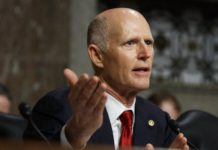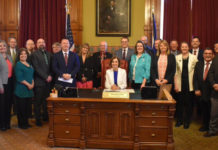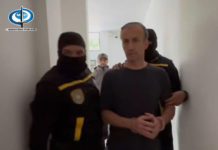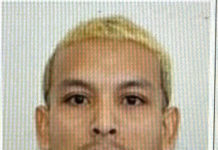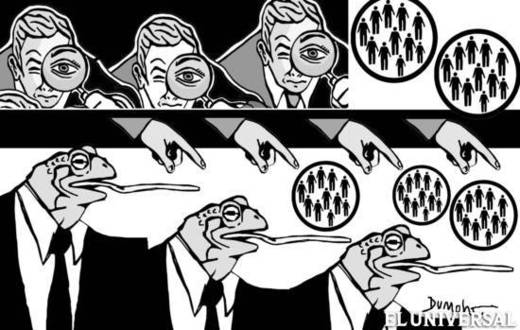
Law on Counter Intelligence on standby
The law reform against terrorism just needs President Chávez’s signature. The analysis of its content leaves in evidence the risk of its deliberate use against civil societies
 |
When Venezuelan President Hugo Chávez signs such law reform, every citizen will be suspicious; but, suspicious of what? Of something strange, of something irregular, of being a terrorist, of being an offender. Additionally, every citizen will have to become complainant of neighbors actively. Everything must be monitored. Everything must be reported.
Passed in the second discussion by the pro-government majority at the National Assembly (AN), the “tell-tale law” (Law on Counter Intelligence) only awaits the National Executive’s enforcement to start circulating with its peculiar definition on what a terrorist act means and with that Article 9 that encompasses Venezuelans as “obliged subjects.” Note that there is no discrimination, except for the legal age.
But bound to do what? Among other things, to be accusers of anything that may look irregular, even though it is lawful. And what are the specific parameters to consider something suspicious? You figure it out.
Deputy Eduardo Gómez Sigala was among the first ones who warned about this matter that has been labeled as a new version of the “tell-tale law” of 2008. “The law under reform always provided for fight against organized crime, but the truth is that this government has never done it. Scandals like the one with tons of spoiled food from Pdval illustrate this quite well. Such modifications are so inaccurate that they include every citizen and also make any offense be considered terrorism or organized crime,” Deputy Gómez explained. “Behind the pretext of fighting terrorism lies a device purposely built to intimidate and pursue civil and political figures; it is rather State terrorism which obliges citizens to denounce others under the pressure of fines of up to one thousand tax units.”
Julio Borges, a deputy and coordinator of Primero Justicia (Justice First) party, briefs the concern: “This law tramples the right to free association, to protest and supposes that everyone is suspicious.” And he adds: “NGOs and political parties are included among the obliged subjects. In consequence, this halts any advance that the law might make and criminalizes dissent and criticism in Venezuela.”
From a technical and legal stand, the first big criticism of the law reform is the mixing of two matters that -although they relate to each other- are indeed distinct: terrorism and organized crime. But the existing fear that it might be used a prosecution tool has solid grips. The very definition of terrorism is just one.
Article 4 of the text discussed at the National Assembly, defines a “terrorist act.” Incidentally, not even the United Nations (UN) has reached an agreement in this regard. Nevertheless, what worries the most is not the term but the possible consequences.
It is expressed in it -in brief- that they are acts intended to “seriously damage a country or an international organization” and they are committed with the “intent to intimidate seriously a population; oblige improperly governments or international organizations to commit an act or deprive them from committing it; or destabilize seriously or destroy the fundamental political, constitutional, economic or social structures of a country…”
The explanation of the means used for committing terrorist acts includes the following: attacks against anyone, holding anyone hostage or kidnapping, “causing massive destruction to a government or public facilities, transportation systems, facilities,” destruction of public places and even interruption of water and electrical service. How is massive destruction caused to a government? You figure out.
Betray, for anything will remain
“This definition turns out dangerous because it allows the deliberate use of its concept,” says criminal lawyer and university professor Tamara Bechar: “Virtually any action and therefore any citizen that takes it may be branded as a terrorist.” Or as an organized crime member. And it is not an exaggeration.
Article 27 specifies what an organized crime offense is like: an action taken by three or more persons together or one person acting on behalf of a legal entity.
And combining one thing with the other; “any act of protest or demonstration may be labeled as terrorism under this law; which as a result, the right to dissent is finished off.”
Carlos Correa, the director of NGO Espacio Público (Public Space), sees everything clearly: “Lawmaking is so generic that it will brand as terrorist, for instance, any civil societies that appeal to international authorities if denouncing the State is to be regarded as terrorism, as well as those citizens who make acts of protest in the street.”
Article 9 clears any doubts on the pointing finger: subjects obliged by this law are enlisted in it. In addition to bankers, insurers, stockbrokers, hotel managers, casino managers, accountants, car and building salesmen, its includes – numbers 6 and 7- foundations, civil associations, non-governmental organizations, non-profit organizations, political organizations, voters’ associations and citizens’ groups. “Virtually the whole population that has political rights in Venezuela,” Tamara Bechar points out.
What does this stand for? It means that civil societies of any kind -actually, the whole Venezuelan population- are bound to comply with this regulation. It is explained in Chapter II of the law reform and it also establishes the penalty for failure to comply with the regulation. For instance: those who establish economical relationships with individuals or legal entities “whose identity cannot be determined fully” are punished with a fine amounting from 500 to 1,000 tax units.
Obliged subjects are liable to detect “any unusual or shady transaction” and then report those transactions that seem to be linked with money-laundering, terrorism or organized crime to the future National Office Against Organized Crime and Financing of Terrorism. “Likewise, they will need to devote careful attention to such activities even though its source is lawful.” Disobedience to such law results in a fine between 500 and 1,000 tax units.
“Venezuelan State is holding people responsible for actions that do not correspond to them,” explains Bechar on this matter about watching and reporting. “And it is quite serious that one is bound to denounce even lawful activities. How am I supposed to know what is suspicious and what is not? How am I supposed to know whether any sum of money will be eventually spent in shady deals? Knowing that is my responsibility? It is neither established the amount of money that encompasses a shady operation, USD 23, 25 or 232, 56.”
From day to day, supposes Bechar, banks will have to report to the special office every transaction that their clients make in order to not run risk of fine. Car, building and insurance salesmen -briefly, everyone- will need to follow the same guideline, even in simple operations like buy-sell. At least until clear guidelines are implemented: what is the timing to suspect in a “formal” manner?
Translated by Adrián Valera Villani


